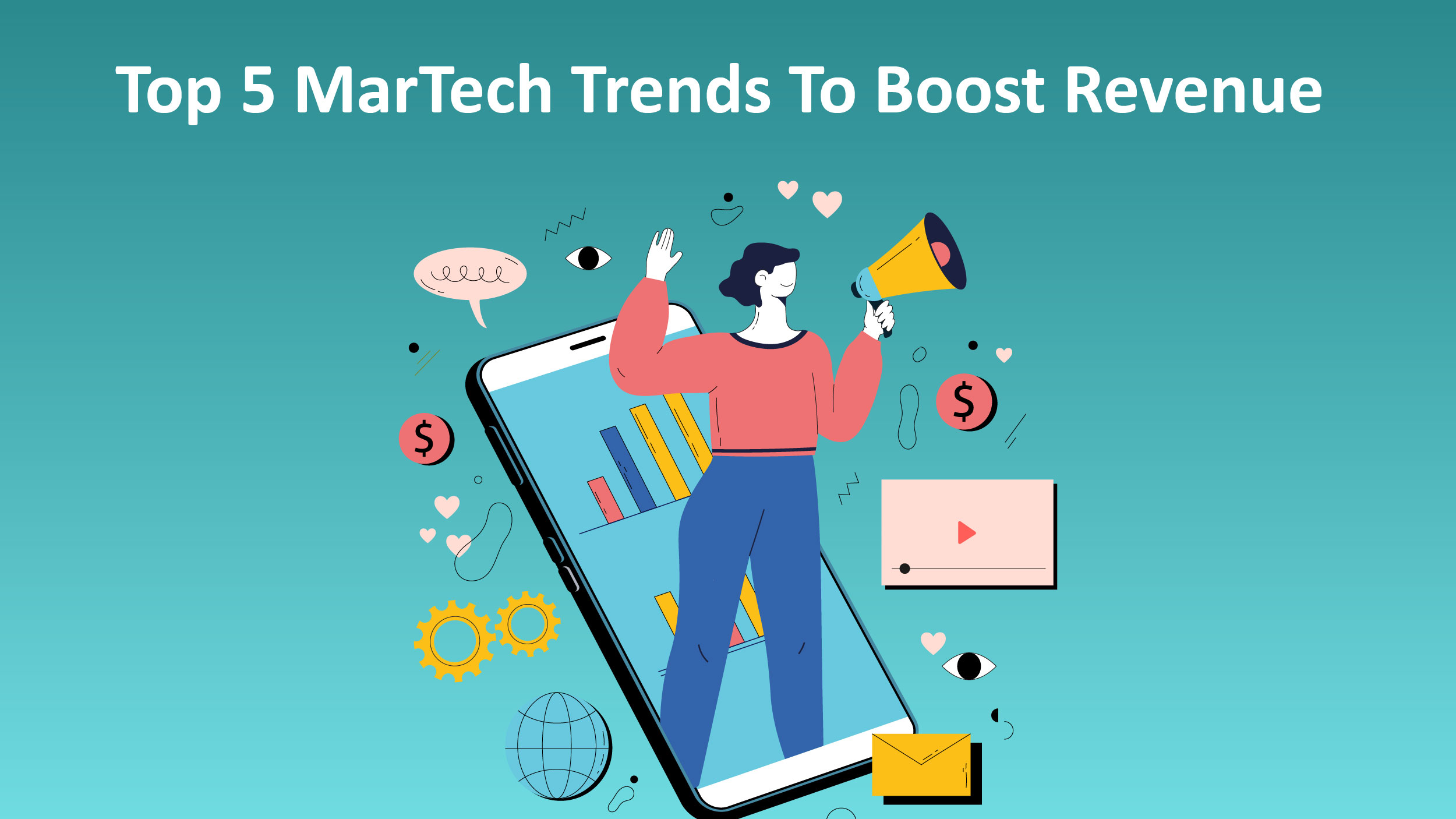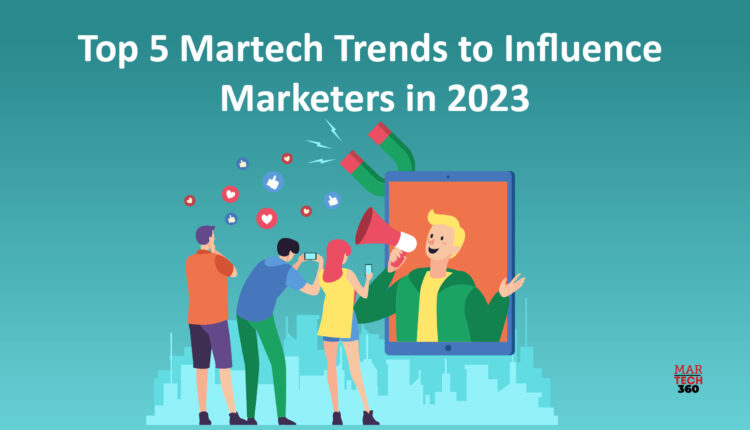Throughout the years, new trends in marketing technology continue to arise, expanding the limits of what can be achieved, transforming the way businesses engage with their target audiences, and establishing fresh standards for marketing accomplishments.
In order to provide you with a thorough grasp of each trend’s possible impact, advantages for your company, and strategies for using them to stay ahead of the curve, we will examine the present state of MarTech breakthroughs and break down five of them in this post.
Let’s get started!
What is MarTech?
Marketing technology, also known as MarTech, pertains to software and platforms that assist individuals or businesses in accomplishing their marketing objectives.
This term is highly comprehensive, encompassing a wide range of topics, including email templates and data analytics.
Every individual, agency, or company has their own specific MarTech requirements, and the ever-expanding industry is consistently evolving to meet any gaps in the market.
In the last two decades, the industry has experienced remarkable and rapid expansion. Nowadays, being a marketer doesn’t necessarily require advanced technical skills, but it does necessitate a thorough grasp of the advantages that tools can offer in enhancing your strategy and achieving your objectives.
Your rivals are probably leveraging martech to enhance the effectiveness of their campaigns. If you haven’t considered utilizing martech to automate, optimize, and generate ideas for your campaigns, it’s high time you begin.
Top 5 MarTech Trends To Boost Revenue
 The various strategies your business may currently be pursuing, such as increasing revenue, embracing digital technologies, leveraging data, or enhancing your brand, need to be assessed. These marketing technology trends have the potential to help your company differentiate itself in a competitive market by providing valuable insights into emerging marketing technologies. Ultimately, they will aid you in creating a new marketing technology roadmap that aligns with a range of strategic objectives.
The various strategies your business may currently be pursuing, such as increasing revenue, embracing digital technologies, leveraging data, or enhancing your brand, need to be assessed. These marketing technology trends have the potential to help your company differentiate itself in a competitive market by providing valuable insights into emerging marketing technologies. Ultimately, they will aid you in creating a new marketing technology roadmap that aligns with a range of strategic objectives.
Listed below are the top 5 martech trends to help you grow your business in 2023 and beyond.
Also Read: Mobile Miracles: Creating Seamless Customer Journeys
1. Personalization Technology
With the prevalence of chatbots, live chat, self-service, and customized products/services, the customer experience has never been more personalized. As a consequence, sending marketing emails to customers is a thing of the past, and all businesses must adopt an omnichannel strategy.
The primary goal is to make customers feel more connected to your brand and to avoid giving them the impression that you are only interested in their money. In this context, sentiment analysis is especially important because it can assist marketers in increasing personalization and, as a result, driving a better customer experience.
According to a survey, almost all marketers, specifically 99 percent, believe that personalization plays a crucial role in improving customer relationships. Additionally, a significant percentage of consumers, precisely 44 percent, express their willingness to switch to a brand that offers more personalized marketing content.
2. Artificial Intelligence, IoT, and Big Data Analytics
It was expected that by 2020, 75 million devices will be linked to the Internet of Things (IoT). This translates to a nearly infinite amount of consumer data for marketers to use – for example, sentiment analysis derived from big data analytics can be used to predict customer behavior. As a result, customized offerings are likely to become the norm. Furthermore, the importance of Artificial Intelligence (AI) in MarTech is growing, with chatbots already handling complex transactions.
According to a study conducted by PWC, 72% of marketers consider AI to be a beneficial tool that provides a competitive edge for each individual customer.
3. Virtual Reality in Marketing Strategy
Marketers are in a never-ending race to capture more eyeballs and retain an increasing number of customers, and implementing Virtual Reality (VR) or Augmented Reality will give brands a competitive advantage. A significant number of companies have already begun to experiment with virtual reality. IKEA’s VR app, which allows customers to see how an item will look in their home before purchasing it, is a prime example of how to use this technology to improve the customer experience.
Since VR provides an immersive 360-degree perspective, a virtual design of a product can easily be a luscious offering for customers who want an interactive experience, simplifying the buyer’s journey.
4. The Metaverse
The metaverse is today’s futuristic blend of virtual reality (VR), augmented reality (AR), and artificial intelligence (AI), culminating in a new 3D immersive experience in which users blend the physical and digital. Users can create their own avatars, which allow them to “feel” experiences without having to buy them. This has given rise to the marketing industry’s newest term, “gamevertising,” which refers to the use of gaming by marketers and brands to advertise their products.
5. MarTech Architecting
This may be a foreshadowing of future events in the martech space, but the role of a marketing architect is set to rise sharply in the coming years. Firms have been slow to recognize the need for such a role thus far. However, as more businesses invest in developing a highly efficient martech stack, going without a marketing architect will become an impossible task.
Wrapping it Up
 Marketing technology is undergoing rapid transformation, offering businesses distinct possibilities for engaging customers and achieving success. Noteworthy developments encompass a strong emphasis on customer privacy and safeguarding data, integration of data, the integration of artificial intelligence and machine learning in marketing automation, advancements in chatbot technology, prioritizing mobile platforms, and implementing highly personalized marketing strategies. Embracing these advancements will play a pivotal role in shaping a promising future for customer engagement and fostering growth in the ever-evolving marketing landscape.
Marketing technology is undergoing rapid transformation, offering businesses distinct possibilities for engaging customers and achieving success. Noteworthy developments encompass a strong emphasis on customer privacy and safeguarding data, integration of data, the integration of artificial intelligence and machine learning in marketing automation, advancements in chatbot technology, prioritizing mobile platforms, and implementing highly personalized marketing strategies. Embracing these advancements will play a pivotal role in shaping a promising future for customer engagement and fostering growth in the ever-evolving marketing landscape.


Comments are closed.